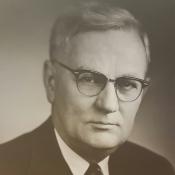Andrew Barr, Jr.
 The son of Andrew and Hortense Call Barr was born on May 6, 1901, in Urbana, Illinois, where he attended high school, graduating in 1919. He received a bachelor's (1923) and a master's (1924) degree from the University of Illinois where he was elected to several honoraries. He received an honorary Doctor of Business Administration degree from George Washington University (1985) and an honorary Doctor of Laws degree from the University of Illinois (1990).
The son of Andrew and Hortense Call Barr was born on May 6, 1901, in Urbana, Illinois, where he attended high school, graduating in 1919. He received a bachelor's (1923) and a master's (1924) degree from the University of Illinois where he was elected to several honoraries. He received an honorary Doctor of Business Administration degree from George Washington University (1985) and an honorary Doctor of Laws degree from the University of Illinois (1990).
In 1924, the same year he was certified as a CPA (Illinois), he joined the Chicago accounting firm of Reckitt, Benington, and LeClear as a staff accountant. Resigning in 1926, he accepted an appointment as instructor in accounting in the Economics Department at Yale University and while teaching, studied economics in the graduate school (1926-32). He remained at Yale on the accounting faculty until he joined the SEC as a research accountant in 1938. He served in this capacity until early 1941, at which time he was called to active military duty.
Assigned to the 3rd Armored Division, he served as Lieutenant Colonel, Assistant Chief of Staff G-2 (Intelligence) primarily under VII Corps, First Army, ETO; he was official historian 3rd Armored Division for World War II. Although discharged from active duty as a colonel at the end of the war, he continued as a member of the Army Reserve until 1961. A founder of the Third Armored Division association (1948), he served as its president (1954-55) and as a member of its board of governors for several years and in 1980 he was made honorary president. When discharged in 1946, he returned to the SEC as a research accountant again. He later served as assistant chief accountant from 1947 to 1950 and chief accountant of the SEC's Division of Corporation Finance from 1950 to 1956. He became chief accountant in 1956, a position he held until he retired from the SEC in 1972.
Actively involved in professional organizations, he was a charter founder of the Federal Government Accountants Association in 1950, now known as the Association of Government Accountants. He later served that organization as president (1953-54). He served the District of Columbia Chapter, NAA as president (1961-62), vice president (1959-61), and director (1955-57; 1958-59). In 1956 he was vice president of the AAA. He was a member-at-large of the Council of the AICPA and a consultant to its Washington Office (1972-75). He was also a member of the Financial Accounting Standards Board Advisory Council (1973-76). In addition to the above professional affiliations he holds honorary memberships in the Illinois Society of CPAs (1970) and the District of Columbia Institute of CPAs (1972).
Among his many awards and honors is the National Civil Service League's Career Service Award (1955). In l960 he received the highest honor the federal government bestows on a career employee, the President's Award for Distinguished Federal Civilian Service. In 1961 he was awarded the Distinguished Leadership Award of the AGA and that organization's Robert W. King Memorial Award in 1968. He is the recipient of the Alpha Kappa Psi Foundation Accounting Award (1963), the AICPA's Gold Medal Award (1964), and SEC's Distinguished Service Award (1967).
He had written numerous articles for professional journals and delivered numerous speeches to professional groups. He served as a visiting professor of accountancy at the University of Illinois during the spring semester of 1972. He was elected to the University of Illinois chapters of Beta Alpha Psi and Beta Gamma Sigma (1921). Later he was elected to Phi Kappa Phi.
Andrew Barr died on November 29, 1995 at age 94.
 The son of Andrew and Hortense Call Barr was born on May 6, 1901, in Urbana, Illinois, where he attended high school, graduating in 1919. He received a bachelor's (1923) and a master's (1924) degree from the University of Illinois where he was elected to several honoraries. He received an honorary Doctor of Business Administration degree from George Washington University (1985) and an honorary Doctor of Laws degree from the University of Illinois (1990).
The son of Andrew and Hortense Call Barr was born on May 6, 1901, in Urbana, Illinois, where he attended high school, graduating in 1919. He received a bachelor's (1923) and a master's (1924) degree from the University of Illinois where he was elected to several honoraries. He received an honorary Doctor of Business Administration degree from George Washington University (1985) and an honorary Doctor of Laws degree from the University of Illinois (1990).